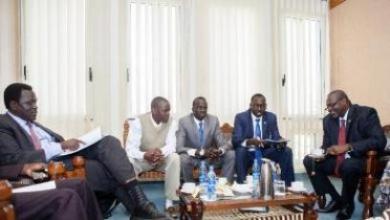SPLM-IO leadership recalls back to Pagak senior members of advance team for consultation
January 16, 2016 (ADDIS ABABA) – Senior officials of the armed opposition faction of the Sudan People’s Liberation Movement (SPLM-IO) under the leadership of the former South Sudanese vice-president, Riek Machar, have been recalled from Juba back to the opposition faction’s headquarters of Pagak, near the Ethiopian border for consultations.

“It is true. The Chairman and Commander-in-Chief of the SPLM/SPLA (IO), Comrade Dr. Riek Machar Teny-Dhurgon, has recalled members of the Political Bureau and state leaders from Juba to Pagak. This is to convene a consultative meeting of the leadership on the outstanding issues in the implementation of the peace agreement,” Machar’s spokesman, James Gatdet Dak, confirmed to Sudan Tribune on Saturday.
Earlier, a source in Juba who is a member of the advance team of the opposition also told Sudan Tribune that the SPLM-IO’s Chief Negotiator, Taban Deng Gai, briefed them on Saturday about the need for the consultations and informed them that the officials will fly back to Pagak in the next few days.
Dak said the leadership meeting would take place as early as Tuesday to collectively resolve on a way forward before the leaders could return to Juba.
He said there are a number of outstanding issues including the 28 states which the government unilaterally created on 2 October after the peace agreement was already signed. The agreement was based on the current constitutionally recognized 10 states in the country.
While the SPLM-IO said it could not recognize the 28 states, describing the decision as a violation of the agreement and asking the government to reverse the decision, the government on the other hand vowed not to revoke the decision, saying it was a demand of the people of South Sudan.
Among other outstanding issues include implementation of the security arrangements which was supposed to be implemented within the 90 days of pre-transitional period from the signing of the peace deal.
This includes demilitarization of the capital and deployment of joint police and military forces from the two rival armies.
The transitional constitution also should have been amended to incorporate the peace agreement and to serve as the basis for formation of a transitional government of national unity (TGoNU).
The opposition faction has refused to announce and submit its nominees to the selected ministerial portfolios for formation of the government, citing delay in the amendment of the constitution.
The government in response also passed a resolution on Friday in a Council of Ministers meeting chaired by President Salva Kiir in which they also suspended formation of the transitional government until the constitution is amended.
Only the former detainees led by Pagan Amum announced their nominees to the ministerial positions, despite absence of their leader, Amum, from Juba.
JUBA EVICTS SPLM-IO TEAM FROM HOTELS
Dak also said the leadership has been informed of the decision by President Kiir’s government to stop accommodating members of the advance team of the SPLM-IO and would evict them from hotels by 22 January.
He said the government cited lack of money to pay for the accommodation also including lack of commitment from the international partners to continue to shoulder the bills.
Observers say the decision to stop accommodating the opposition’s members could be a result of frustration from the government which had tried to rush the formation of a transitional government without implementing the required provisions in the accord.
With the current delays and stalemates in the implementation of the peace deal, sources close to the processes said the formation of the transitional government may only take place in February or March.
(ST)
